An Open Book With an Open Throttle
Lance Fenderson’s racing career came to a halt his junior year of high school. Now, however, as he prepares to graduate from NC State with his degree in mechanical engineering, he’s going wide open on professional racetracks.
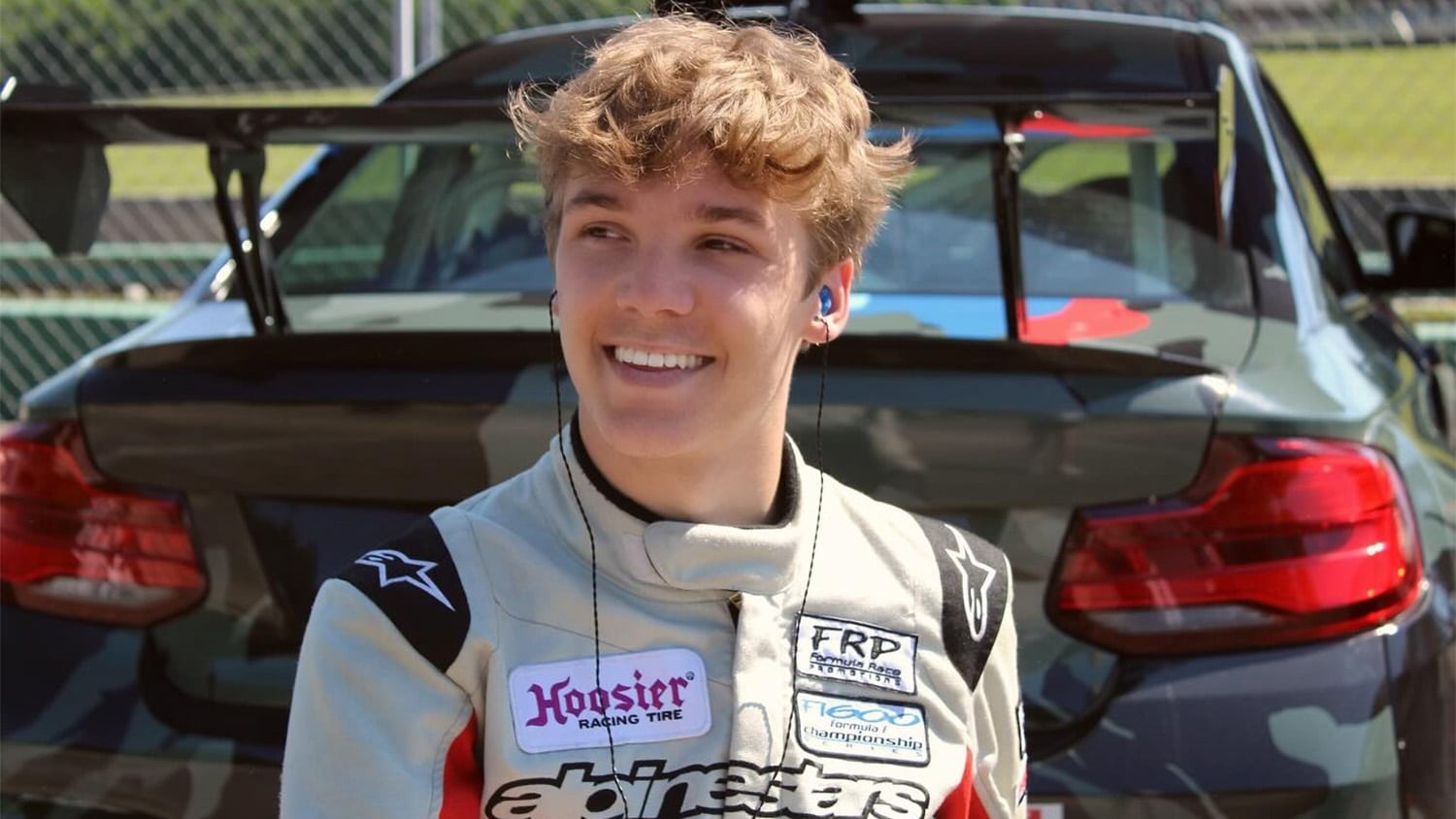
Lance Fenderson only remembers a few details from May 10, 2019 — the day that changed his life forever.
One of them was pretty vivid.
Lying on the grass at the Asheville School’s lacrosse field, sometime in the third quarter of a high school playoff game, the Davidson Day School midfielder remembers looking up to see his parents Troy and Christine Fenderson standing over him, with frightened looks on their faces.
“Leading into the game, it had been like any other day,” he says. “But after being hit by an opposing player, my neck was immediately fractured.”
“I was paralyzed on impact.”
He knew he was badly injured — later to be diagnosed with four broken vertebrae in his neck. He knew immediately that his future would be changed — he couldn’t feel his legs, and his arms were tingling numb. He had no idea the next six months would consist of hospital rooms, rehabilitation centers and unexpected shutdowns from a global COVID-19 pandemic.
“It’s going to be OK, Mom,” he said, without knowing if any part of that statement was true.
One thing I was told that really stuck with me is that my life would not get easier, but it would become more normal.
For the next two weeks, the young player who had grown up in New Hampshire but moved to the North Carolina town of Mooresville at the age of 12 was stuck in an Asheville hospital. Four months after that, he was in a rehabilitation center in Atlanta, relearning how to breathe and undergoing countless hours of physical and occupational therapy.
“The first couple weeks, it was all stabilization, just making sure that I was going to survive,” Fenderson says. “It was a very valid concern at the time. Many times, patients like me end up with pneumonia because their lungs stop functioning.
“One thing I was told that really stuck with me is that my life would not get easier, but it would become more normal.”
After he was eventually released, he spent the first semester of his senior year at Davidson Day School taking virtual classes. He returned to campus just in time to be sent home for pandemic shutdowns.
He vaguely remembers sending off 12 college applications — but only because he received 10 acceptance letters back, not because of the details he included in them.
The one that stuck out, however, was from NC State, where he had applied to pursue his dream of becoming a professional race car driver with a degree in mechanical engineering, following the career path of so many other racers and crew members.
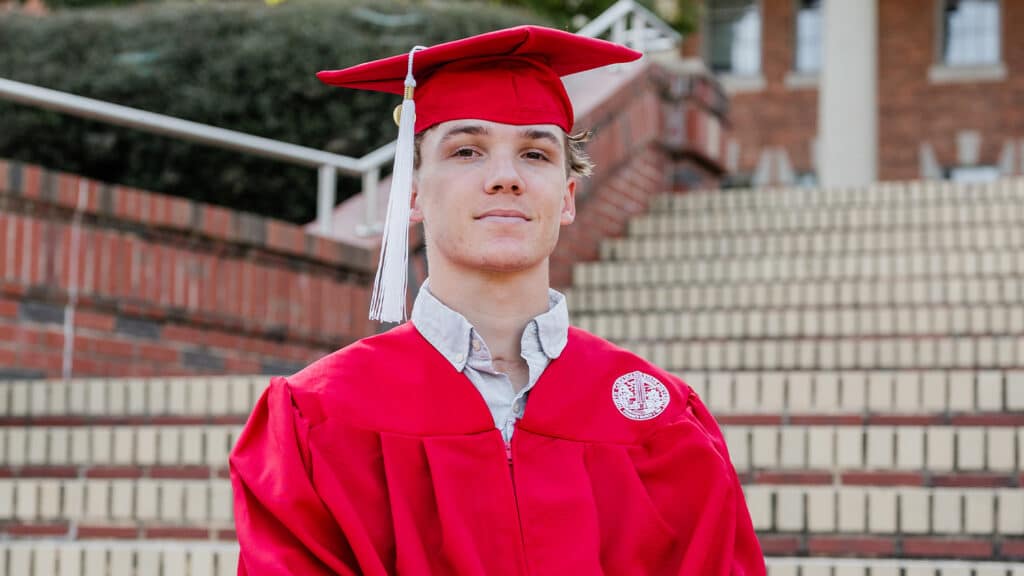
A Racing Background
Fenderson began racing go-karts at the age of 5, when his family still lived in New Hampshire. It was long before they moved to the professional racing mecca of Mooresville, which is home to multiple NASCAR race teams and affiliate industries, all a part of North Carolina’s $6 billion racing economy.
At the age of 14, he was involved in the F1600 series, which uses entry-level Formula cars — open-wheel, Indy-like cars, without the distinctive downforce wings.
Fenderson spent four years as a teenager driving at various levels, traveling around the country for weekend events at racetracks with other aspiring drivers.
He may have flipped a few go-karts in his day, but Fenderson says he never sustained a major injury, despite innumerable hours of worry from his family.
His lacrosse accident ended his dreams of speeding through curves, driving on backstretches and crossing the finish line under checkered flags — but only for a few years.
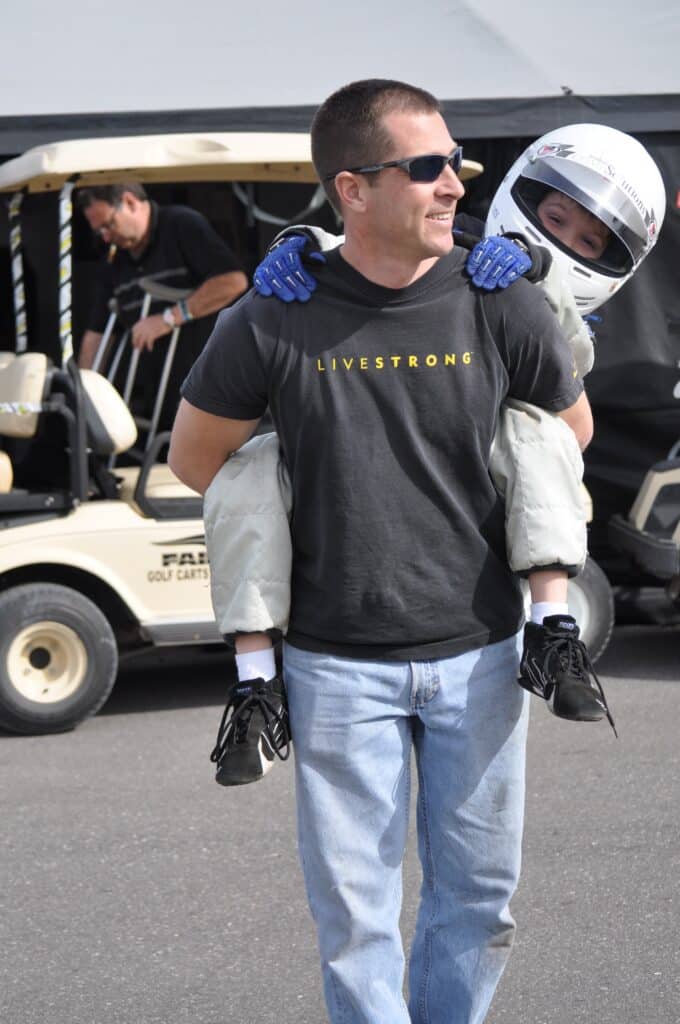
Back Behind the Wheel
Fenderson didn’t know what life had in store for him after high school. He came to NC State, along with his girlfriend, Abby Dudley, who earned a degree in psychology last spring.
He joined a fraternity. He went to football and basketball games. He enjoyed all the other activities that his classmates enjoyed on campus.
And, like many COVID-affected students, he occasionally found himself isolated, scrolling on his phone for hours on end. In February, stuck in his Hillsborough Street apartment, Fenderson made a decision.
“I enjoyed hanging out with friends when I could, but one thing that really stuck with me was the question that everybody gets: ‘What do you like to do with your free time?’” Fenderson says. “I was asked that one day, and I didn’t know how to answer it.
“I needed to find myself again, because you should know what you like to do. That’s when I wanted to start racing again.”
It was not an easy proposition. Fenderson had a factory-built BMW M240iR race car his family bought last fall, capable of going more than 150 mph. Because he only has partial motion and dexterity in his hands, he had to make even more modifications than other paraplegic drivers. His limited soft-tissue mobility prevented him from using paddles or buttons.
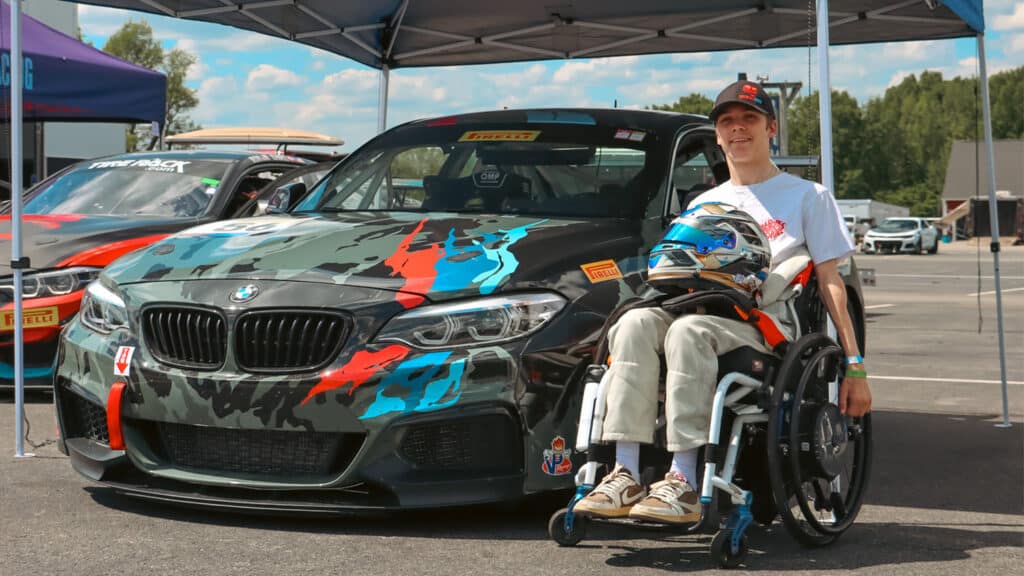
So he navigates with his right hand, using a pin on the steering wheel to go through curves and straightaways. With his left hand, he uses levers to accelerate and brake, pulling to go faster and pushing to slow down.
Shifting, however, was the hardest problem to solve because both hands are occupied at all times. Since he has a computer racing simulator, he managed to modify a straw-like device to shift virtually, inhaling to upshift and exhaling to downshift. While it was quite a leap to convert that technology to the controls of a race car, his engineering background convinced him it was possible.
“I will never claim to be an electrical engineer, but just knowing that signaling is just a voltage being sent to the computerized controls helped me,” he says. “It’s just the same way that a car recognizes paddle shifters. They’re all fully electronic and computerized. I knew that it would be possible.”
A viable task, if not an easy one.
“The concept itself was pretty seamless in my head, so I just had to find the right person to help me do that,” Fenderson says. “If it wasn’t for my engineering training here, I wouldn’t have been so confident I could find that person.
“I don’t think there is anybody out there using the same kind of technology. There are other drivers with spinal cord injuries, mostly paralyzed from the waist down, meaning they have full finger dexterity.”
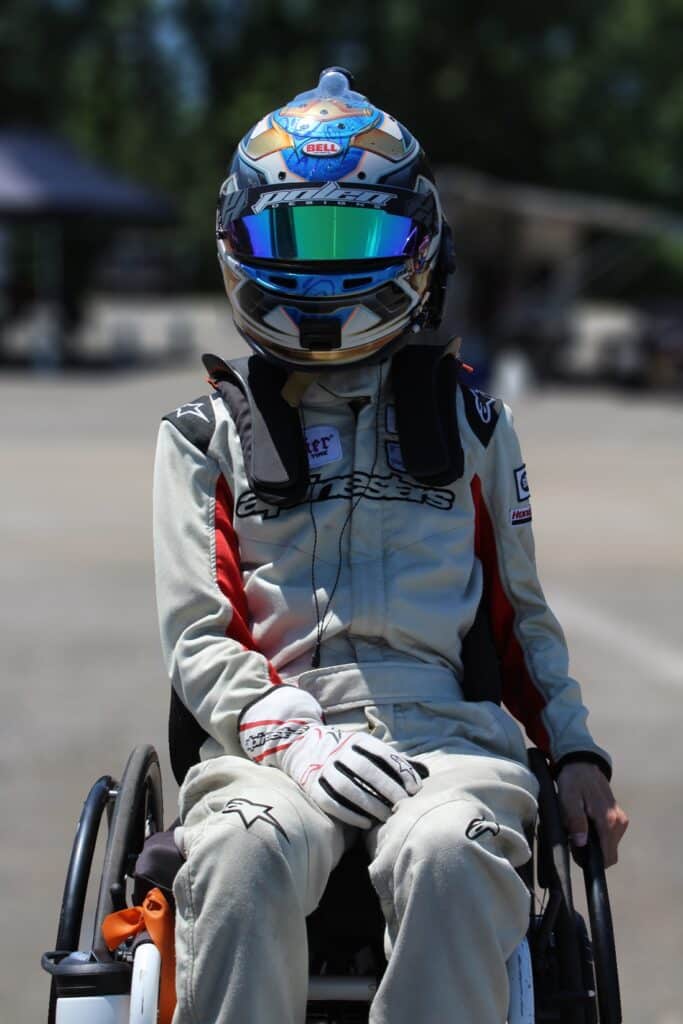
Getting a racing license wasn’t easy, but he eventually obtained a BMW Car Club of America license that paved the way for his return to racing. Once the technology was installed, he was physically ready to race again.
Mentally, however, he was much more reticent.
“It was terrifying, to be honest,” Fenderson says. “The steering wheel was lighter. My pecs, arms and hands are compromised. Steering the wheel with one hand is difficult. It felt like I didn’t have a ton of control at first.
“I was just kind of scared at first. I was thinking that I was actually going to kill myself this time. What am I trying to do? It just didn’t feel right, the way I remembered being in a race car. There was a lot of uncertainty.”
Over the first couple of weeks, he became more comfortable. The muscle memory returned, if not the muscle mobility. It all seemed to be more familiar.
When he finally returned to the track for officially sanctioned events, he won his first four races.
A Return to Normalcy
Fenderson is part of a generation of new graduates whose lives and experiences were disrupted by the pandemic and the mandatory responses to it. Many are still struggling to find a sense of normalcy as they begin their post-academic lives.
He has had different challenges as well, learning to live under new circumstances. That’s why his return to his racing roots has helped him overcome some of those challenges.
“Racing is the only thing I have found where anybody in a wheelchair can go out and compete, succeed and be better than any able-bodied person competing in the same sport,” he says. “Nobody has any idea that behind the carbon and the sheet metal, that you are doing anything differently.
“That’s really empowering for me. In sports like wheelchair basketball or wheelchair rugby, everything is modified. This is something I can do in which I can beat able-bodied people and nobody has a clue that I have abilities that might hold me back.”
This is something I can do in which I can beat able-bodied people and nobody has a clue that I have abilities that might hold me back.
Since there are few, if any, racers with the same abilities as Fenderson, he’s happy to serve as an inspiration for those who may want to follow in his tracks. He actively shares his story and his racing results on social media, getting constant positive feedback.
“I like to say that I am not doing this for me or my mental health,” Fenderson says. “I like to think I am doing this for other people in similar situations who haven’t found what they want to do. I know what it’s like to live in my situation and having the feeling of not wanting to get out of bed in the morning.
“The fact that I have the health, the mentality and the family support to be able to go and do what I love is incredible. And I’m very lucky.”
A Fast Future Approaching
Fenderson will receive his bachelor’s degree in mechanical engineering from NC State on Thursday. He will immediately leave for a racing convention in Indianapolis on Friday, where he will participate in a panel discussion Sunday about his racing journey, then return home Saturday for his commencement party.
With a car, a racing license and a little success on the track already behind him, he hopes to keep moving upward on the racing circuits. He’s in the process of getting a National Auto Sport Association license.
In a couple of years, he hopes to qualify for the International Motor Sports Association series, sports car racing’s highest level.
For now, it seems, everything is going to be OK.
- Categories:


